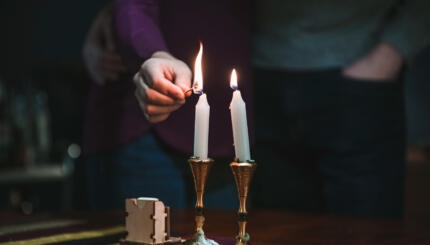First Jewel: Remember the Goodby Neil Cooper
Note to Self,
Each year you use the High Holidays as a reminder to take stock of the year which has passed. What has occurred? How did you grow? What has changed? Knowing how busy and increasingly forgetful you are, I take this opportunity to remind you not to overlook three moments:
- Reading an EKG in his office, my doctor said to me, “You may have an arrhythmia. You need to see a cardiologist.” Several doctors and two stress tests later, the results came back. Your heart is strong. No arrhythmia. Do you remember how you felt upon receiving that news? You said, “I dodged a bullet.”
- As you drove across that intersection, a car, coming from the driver’s side of your car, sped up to run the red light. His car missed hitting yours by a fraction of a second. Don’t forget what you said: “I could have been killed!”
- Your daughter got married. As you stood with her beneath her chuppah (just before you started crying), do you recall what you thought? You thought, “I can’t believe this is happening. She is so beautiful. I never thought this day would come!”
Carry these moments with you as you cross over into the new year. Remember how fragile and tentative your life is. A diagnosis. A speeding car. Your life could have ended. Your daughter’s wedding. Your year has been filled with blessings of life, health and unparalleled joy.
With your help, My Jewish Learning can provide endless opportunities for learning, connection and discovery.
Dear Self, don’t forget to be grateful. Don’t forget to thank God. You deserved none of the above. Many worthy people have not been so blessed. These were gifts for which you must give thanks.
Just thought I would remind you,
Me
Neil Cooper is the Senior Rabbi at Temple Beth Hillel – Beth El in Wynnewood, Pennsylvania. www.tbhla.org
Second Jewel: Honor Your Feelings in Writing
by Letty Cottin Pogrebin
For the last three years, I’ve been writing a book entitled Shanda: A Memoir of Shame and Secrecy in which I revisit aspects of my life that were shaped by my parents’ humiliations. I delve deep into their shame about being greenhorns (immigrants), impoverished, imperfect, unhappy, inadequate — and their abiding fear of disgrace, the shanda. Retrieving childhood feelings and experiences is hard at any age but thanks to my discovery of a large plastic bag stuffed with correspondence dating back more than eighty years, my memory was turbo-charged and the book is richer for it.
The letters my parents wrote to one another in the 1930s and ’40s exposed their inner lives, their searing conflicts, their secrets and fears. Those I wrote as a teenager in the 1950s, when my mother was dying, and through my four years at Brandeis University, reconnected me to my former self and explained, in large part, how I became who I am.
Someone once said, “Jews remember; Jews write” — for us, history is memory and memory history. Sadly, letter-writing has gone out of style; emails are rushed, utilitarian, mostly bare of telling details, intimacy and grace. But some are worth saving. This Rosh Hashanah, I’d like to suggest a New Year’s resolution for young people:
Whenever you write or receive an emotionally meaningful or substantively personal electronic message, print it out. (Words still carry more weight on the page.) File it where it can be retrieved, or stumbled upon by accident like a precious earring or cufflink that turns up years later in the crevice of a couch. Save the raves about your best days and the rants about your worst. Document your feelings before you forget them. Your future self, your future progeny and Jewish history itself will be grateful you did.
Letty Cottin Pogrebin is an activist and the founding editor of Ms. Magazine. www.Lettycottinpogrebin.com
Third Jewel: Power and Vulnerability are Both Part of Life
by Rabbi Adina Allen
A letter to my children,
Midrash teaches that God created the world on Rosh Hashanah. In this particular story, God has a thought, consults with the angels and then begins, forming human beings from the dust. This story depicts a seemingly direct path from the idea to the reality. The Hebrew word used in the midrash is “bara” meaning that God created the world on Rosh Hashanah. Yet, Rosh Hashanah is known by another name — Hayom Harat Olam — the Day the World was conceived.
Where the word bara implies a sense of creation in a moment, harat, conception, means something different. To conceive entails a need to wait, to nurture over time, to become attached, to have sleepless nights, perhaps, of fear and anxiety about what may be, to have moments of joy and yearning, to remain present to all the possibilities, to acknowledge the chance of loss or complications, to wonder and to yearn.
You, my children, are my greatest teachers in learning how to dwell in this realm. You have taught me that there is no rushing. Be it a new life, a new stage of growth, or a new skill — that which we seek to bring into being requires its own natural time to develop. And you have taught me the tender beauty that exists in that place of gentle unfurling.
You came into the world through determination and planning mixed with an utter lack of control and abundant mystery. Thank you for the ways in which you remind me every day that this mix of embrace and surrender, power and vulnerability is the true nature to which we must return.
Rabbi Adina Allen is the co-founder and creative director of Jewish Studio Project. www.jewishstudioproject.org
Fourth Jewel: We are Empowered to Improve the World
by Elan Carr
Dear Elan,
You have always been inspired by the words that open the final parsha of the month of Elul:
אתם ניצבים היום כולכם לפני ה’ אלקיכם
You are standing this day, all of you, before the Lord your God
Spoken just before Rosh Hashanah, these words powerfully prepare you for the Days of Awe. “Standing” has nothing to do with your position relative to the ground. To “stand” here means to be positioned relative to purpose. It implies being held to account, and it evokes that timeless answer to God’s call spoken by Jewish prophets throughout the ages: Hineni — Here am I.
That the Almighty cares enough to judge your acts and demand of you an accounting is more empowering than terrifying. It means that each of us is valuable and powerful. It demands that we treasure our gifts and never take ourselves for granted. And it obligates us to apply our talents for the betterment of our community, our country and our world.
Remember that is the real purpose of the High Holidays. You examine your imperfections over the last year not as an end in itself, but as a means toward an empowered aspiration to reach higher and to be better.
For this approaching year, may we all feel God’s love and be inspired to love ourselves and our fellows, may we be filled with gratitude for our blessings, and may we succeed in vanquishing evil and making our world an even better place.
Yours truly,
Elan
Elan Carr is a Special Envoy to Monitor and Combat Anti-Semitism, US State Department.



